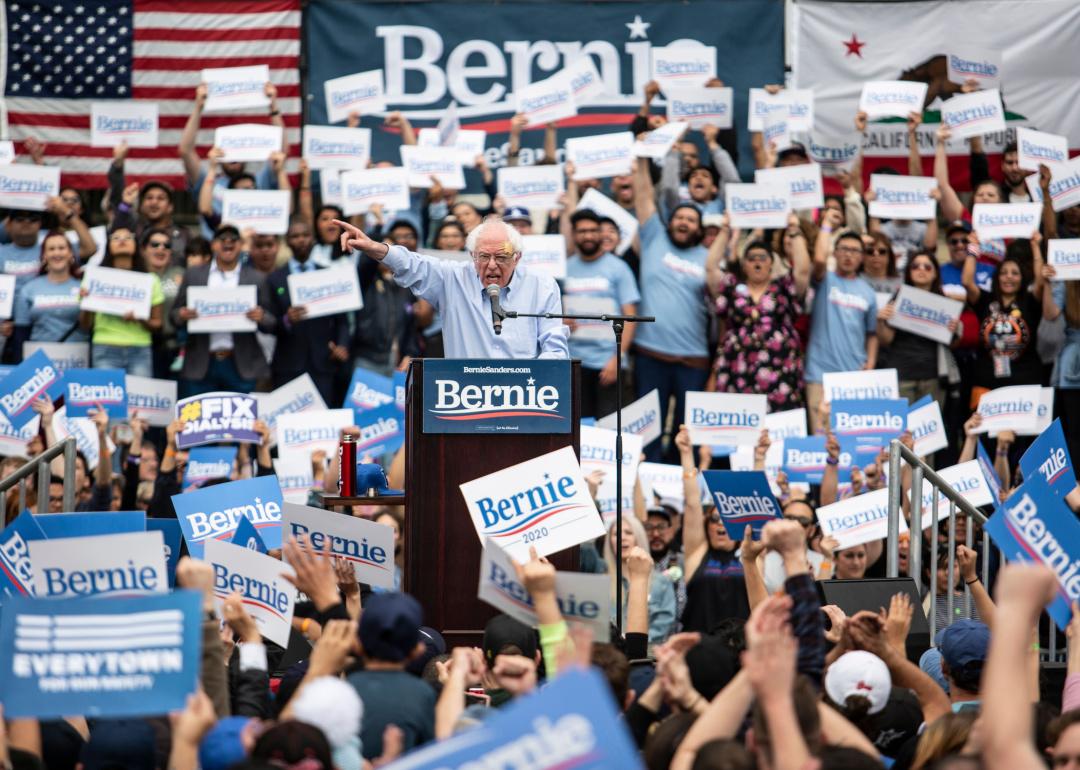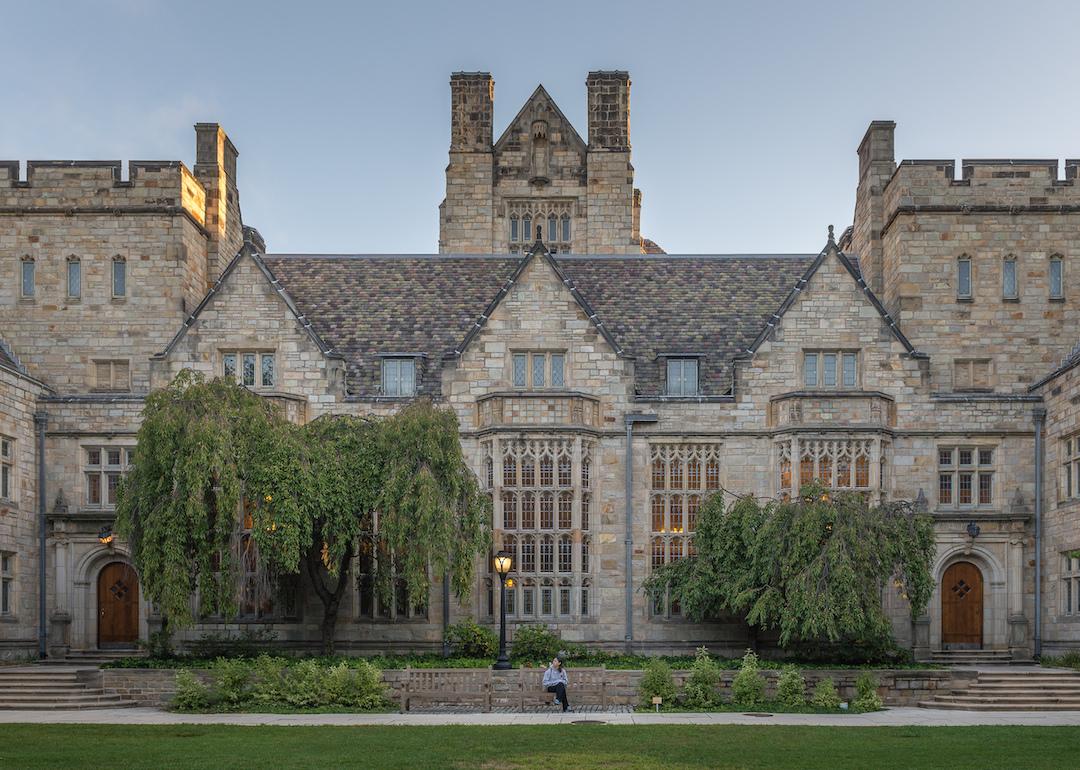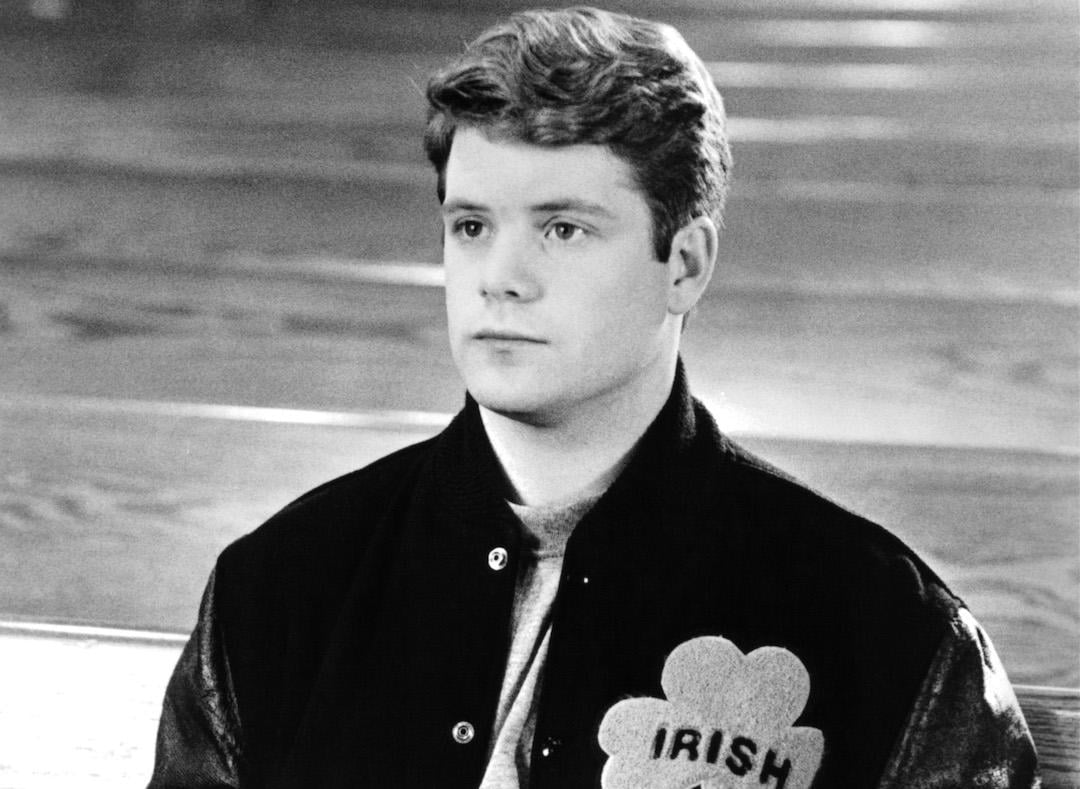
Where are they now: Famous runners-up for the Presidency
Often highly controversial and frequently basted with partisan acrimony, American presidential elections generate great interest in not only who won, but also how the losers managed to lose. Who were these contenders (or pretenders) who came up short, and what are they up to now?
Stacker dug through information from sources including the Federal Election Commission, the U.S. Electoral College, historical accounts, and major news sources to spotlight the lives of 25 vanquished candidates, living or dead, following their losses. The slides include the candidates' parties, the runners-up, the victors, and the margin of defeat in Electoral College votes. The results do not reflect third party or minor party candidates except where they gained more than 25 Electoral College votes.
Whether buried in landslides or just barely missing the mark, the research denotes whether these "also-rans" continued in politics, made further impacts on American society or dropped out of the public eye to pursue other interests.
Read on to get a glimpse into the lives of 25 challengers who fell short.
ALSO: Read to find out which presidential candidates ran the most dominant race.
1900: William Jennings Bryan (D) lost to William McKinley (R)
Electoral College vote: McKinley, 292 Bryan, 155
This was the second of three failed attempts by Bryan to win the presidency. He lost to McKinley in 1896, and to William Howard Taft in 1908. When Woodrow Wilson won the presidency in 1912, he named Bryan as Secretary of State. But Bryan disagreed with Wilson on entering World War I and resigned his post in 1915. Staunchly opposed to the theory of Darwinism, Bryan is best remembered as the attorney who won the so-called Scopes Monkey Trial in 1925. He died five days after the verdict.
1904: Alton Parker (D) lost to Theodore Roosevelt (R)
Electoral College vote: Roosevelt, 336 Parker, 140
Losing to incumbent President Theodore Roosevelt, who ascended to the presidency following the assassination of William McKinley in 1901, Parker himself had ascended to the New York Supreme Court after the death of his predecessor, Justice Theodore Westbrook, in 1885. After the election, he returned to his law practice, representing organized labor, and served a year term as president of the American Bar Association.
1916: Charles Evans Hughes (R) lost to Woodrow Wilson (D)
Electoral College vote: Wilson, 277 Hughes, 254
In a race decided by fewer than 600,000 votes, Hughes moved on after his loss to serve as Secretary of State in the Warren Harding and Calvin Coolidge administrations. He negotiated a separate peace treaty with Germany when the U.S. Senate failed to ratify the Treaty of Versailles in 1919. He served as Chief Justice of the Supreme Court from 1930-1941 and wrote the opinion on a case that determined that prior restraint of the press is unconstitutional.
1920: James Cox (D) lost to Warren Harding (R)
Electoral College vote: Harding, 404 Cox, 127
In a battle between newspaper publishers, Cox lost to Harding by the largest popular vote margin (26.17%) in American history. Cox, who had served two terms as governor of Ohio, went on to build Cox Enterprises, acquiring the Miami Daily News and the Canton Daily News, along with other newspapers and radio stations. The corporation has since grown to 60,000 employees and over $20 billion in revenue.
1932: Herbert Hoover (R) lost to Franklin D. Roosevelt (D)
Electoral College vote: Roosevelt, 472 Hoover, 59
Incumbent Herbert Hoover had the unenviable distinction of serving as president during the Great Depression, and the Wall Street Crash happened on his watch. After his resounding defeat—he lost by more than seven million votes—Hoover became an outspoken critic of Roosevelt's domestic and foreign policies. He opposed the U.S. entry into WWII. Hoover later served under presidents Truman and Eisenhower on commissions studying better efficiency in the federal bureaucracy.
1936: Alf Landon (R) lost to Franklin D. Roosevelt (D)
Electoral College vote: Roosevelt, 523 Landon, 8
Republican Landon lost the Electoral College vote in the biggest landslide in the 48-state era in history. Landon, who served as governor of Kansas from 1933-1937, did not seek further public office, but later supported the Marshall Plan and President Lyndon Johnson's Great Society programs and delivered a series of lectures at Kansas State University.
1940: Wendell Willkie (R) lost to Franklin D. Roosevelt (D)
Electoral College Vote: Roosevelt, 449 Willkie, 82
Prior to the attack on Pearl Harbor, the United States remained neutral in WWII, but Willkie favored greater American involvement to support the Allies. Following the election and the attack on Pearl Harbor, he gave Roosevelt his full support and political assistance, including endorsing military aid to Britain and Roosevelt's Lend-Lease program. He tested the waters for a presidential run in 1944, but withdrew.
1944: Thomas Dewey (R) lost to Franklin D. Roosevelt (D)
Electoral College Vote: Roosevelt, 432 Dewey, 99
The former three-time New York governor ran unsuccessfully for president in both 1944 and 1948, losing to Harry Truman in 1948 in what was considered one of the greatest upsets in American presidential politics. The "Chicago Daily Tribune" printed its famous "Dewey Defeats Truman" headline prior to the final results of the 1944 contest. Dewey played a key role in the Republican nomination of Dwight D. Eisenhower at the 1952 national convention.
1948: Thomas Dewey (R) and Strom Thurmond (Dixiecrat) lost to Harry Truman (D)
Electoral College Vote: Truman, 303 Dewey, 189 Thurmond, 39
Thurmond, a states' rights and segregation advocate, served as governor of South Carolina beginning in 1946 before leading the States' Rights Democrats (Dixicrats) in 1948. After his election loss, Thurmond was elected to the Senate by write-in vote in 1954. He later supported Republican Barry Goldwater's presidential bid and was reelected to the Senate as a Republican for seven consecutive terms.
1952: Adlai Stevenson (D) lost to Dwight D. Eisenhower (R)
Electoral College Vote: Eisenhower, 442 Stevenson, 89
Stevenson helped found the United Nations, and was named ambassador by President John F. Kennedy to serve as the chief U.S. delegate from 1961-1965. He lost to Eisenhower in landslides in both 1952 and 1956. During the 1960 presidential campaign, a Soviet ambassador offered financial aid and public relations assistance if he decided to run. He considered the offer highly improper and dangerous, and reported the incident directly to President Eisenhower.
1960: Richard Nixon (R) lost to John F. Kennedy (D)
Electoral College vote: Kennedy, 303 Nixon, 219
Nixon lost to Kennedy by about 100,000 votes, the smallest popular vote margin in American history. Nixon went on to defeat Democrat Hubert Humphrey in the 1968 presidential election and, in 1972, soundly defeated George McGovern by a 520-17 Electoral College margin. Nixon would resign in disgrace in 1974 over the cover-up of the Watergate break-in and related offenses. He was the only president, to date, to resign the office.
1964: Barry Goldwater (R) lost to Lyndon Johnson (D)
Electoral College vote: Johnson, 486 Goldwater, 52
Former Senator Barry Goldwater's loss to Johnson by more than 15 million popular votes was one of the most lopsided defeats in the history of U.S. presidential elections. But he remained popular in his home state of Arizona, returning to the Senate by popular vote in 1968, 1974 and 1980. He opposed the Civil Rights Act of 1964 and became a strong advocate for legalized abortion in his final term.
1968: Hubert Humphrey (D) and George Wallace (I) lost to Richard Nixon (R)
Electoral College vote: Nixon, 301 Humphrey, 191 Wallace, 46
Minnesota Senator Hubert Humphrey, who served as vice-president under Lyndon Johnson, returned to the Senate in 1970, and served there until his death in 1978. He was considered a top liberal voice in the Senate, advocating for social welfare, civil rights, and fair employment, and secured bipartisan support for the Nuclear Test-Ban Treaty of 1963. He lost to Nixon by less than a million popular votes. Wallace, the former governor of Alabama, was a well-known segregationist when he ran for president. He was the last non-Democratic, non-Republican candidate to win any pledged electoral votes.
1972: George McGovern (D) lost to Richard Nixon (R)
Electoral College vote: Nixon, 520 McGovern, 17
A two-term Senator from South Dakota, McGovern suffered an overwhelming defeat to Nixon, losing the popular vote by nearly 18 million ballots. He was reelected to the Senate in 1974 but lost in 1980. He lectured as a visiting professor in foreign policy at several universities and, in 1984, declared himself a candidate for the Democratic presidential nomination. He dropped out after finishing third in the Massachusetts primary.
1976: Gerald Ford (R) lost to Jimmy Carter (D)
Electoral College vote: Carter, 297 Ford, 240
Incumbent and former vice president Ford, who ascended to the presidency in 1974 after Richard Nixon resigned, pardoned his predecessor as one of his first acts as president. Following his defeat, Ford and his family moved to Denver, where he successfully invested in oil with Marvin Davis. He supported the Brady Bill with other former presidents and supported an assault weapons ban. By 1988, Ford was serving on many corporate boards.
1980: Jimmy Carter (D) lost to Ronald Reagan (R)
Electoral College vote: Reagan, 489 Carter, 49
Incumbent President Jimmy Carter lost by nearly 8.5 million votes to Reagan. Carter and his wife, Rosalyn, established The Carter Center, a non-governmental, non-profit organization "to improve life for people in more than 80 countries." The Carters have built numerous homes with Habitat for Humanity for more than 30 years, including the annual weeklong Carter Work Project.
1984: Walter Mondale (D) lost to Ronald Reagan (R)
Electoral College vote: Reagan 525, Mondale 13
In the most lopsided Electoral College defeat in the 50-state American history, the former senator from Minnesota and vice president under Jimmy Carter joined the law firm of Dorsey & Whitney after the landslide. Former President Bill Clinton named Mondale as ambassador to Japan in 1993 before Mondale retired from the post in 1996. He narrowly lost a bid to return to his Senate seat in 2002.
1988: Michael Dukakis (D) lost to George H.W. Bush (R)
Electoral College vote: Bush, 426 Dukakis, 111
Democratic hopeful Dukakis lost to Bush by more than seven million popular votes. The retired Massachusetts governor served in office from 1975-79 and again from 1983-91. Following his last term, Dukakis served on the board of directors for Amtrak, and became a professor of political science at Northeastern University, along with other visiting professor posts. He worked to support the successful candidacy of Elizabeth Warren for Senate in 2012.
1992: George H.W. Bush (R) lost to Bill Clinton (D)
Electoral College vote: Clinton 370, Bush 168
George H.W. Bush, the Republican presidential incumbent, lost to Clinton by nearly 6 million popular votes. Following the loss, Bush retired with his wife, Barbara, in Houston although he remained active in politics throughout the 1990s. President Barack Obama awarded him the Presidential Medal of Freedom in 2011. The oldest living president at 94, Bush was released in June from a southern Maine hospital, where he was admitted due to low blood pressure.
1996: Bob Dole (R) lost to Bill Clinton (D)
Electoral College vote: Clinton, 379 Dole, 159
Kansas Senator Bob Dole, who served as the Republican leader of the Senate from 1985-1996, became a political celebrity due in part to his sense of humor. He was a TV commercial spokesman for products such as Viagra and Dunkin' Donuts, among others, and joined the law firm Verner, Liipfert, Bernhard, McPherson and Hand as a registered lobbyist. He registered as a foreign agent in 2003 to represent the government of Taiwan in Washington.
2000: Al Gore (D) lost to George W. Bush (R)
Electoral College vote: Bush, 271 Gore, 266
In one of the closest and most controversial elections in American history, Democrat Al Gore lost to George W. Bush, although Gore won the popular vote by more than 500,000 votes. Gore, a Nobel Laureate, launched the Climate Reality Project in 2006 following "An Inconvenient Truth," his Academy Award-winning film on climate change. He continues to speak publicly on environmental issues.
2004: John Kerry (D) lost to George W. Bush (R)
Electoral College vote: Bush, 286 Kerry, 251
Kerry, a Senator from Massachusetts from 1985-2013, served as Secretary of State under Barack Obama from 2013-2017. As such, he helped arrange the Iran Nuclear deal in 2015 and signed the Paris Climate Accords in 2016. He retired from diplomatic work following the end of the Obama administration but remains outspoken in the political theater.
2008: John McCain (R) lost to Barack Obama (D)
Electoral College vote: Obama, 365 McCain, 173
McCain lost the popular vote by about 9.5 million ballots to the first black president in American history. The six-term Arizona Senator underwent surgery for brain cancer in July of 2017, and returned to the Senate less than two weeks later. On his return, he voted thumbs-down on Republican efforts to repeal the Affordable Care Act. Following Donald Trump's election, he joined with Democrats in calling for a special committee to investigate Russian intervention in the election, and possible collusion by the Trump campaign.
2012: Mitt Romney (R) lost to Barack Obama (D)
Electoral College vote: Obama, 332 Romney, 206
Romney, who served as governor of Massachusetts from 2003-2007, moved to Utah after the election and won the June 2018 Republican nomination for the U.S. Senate in Utah. He'll face Democrat Jenny Wilson. As a candidate for the Republican nomination for president in 2016, he accused then-candidate Donald Trump of being a phony and a fraud, but the two mended fences and Romney garnered Trump's endorsement for the Senate after the latter won the presidency.
2016: Hillary Clinton (D) lost to Donald Trump (R)
Electoral College vote: Trump, 304 Clinton, 227
Although she lost the Electoral College vote, Clinton actually won the popular vote by nearly three million ballots. As the former Secretary of State under President Obama, Clinton called for the raid on Osama bin Laden's compound in Pakistan. Following her election defeat, she created the non-profit Onward Together to support groups that encourage people to get involved, organize and run for office. She authored "What Happened," her memoir of the election, in 2017. She remains an outspoken critic of Trump and his policies, but has stated she will not run again.



